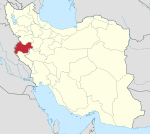
Maeshowe is a Neolithic chambered cairn and passage grave situated on Mainland Orkney, Scotland. It was probably built around 2800 BC. In the archaeology of Scotland, it gives its name to the Maeshowe type of chambered cairn, which is limited to Orkney.

Sanghar District (Sindhi: ضلعو سانگھڙ, Urdu: ضلع سانگھڑ) is one of the largest districts of Sindh province, Pakistan. This district lies between 25058'13 N latitudes and 69024'4E longitudes. It was a village before Mallah Tribe were settled there. This district has the largest Mallah tribe population. It has an area of 9874 square kilometres. It is located in the centre of Sindh and is bounded to the east by India. The district capital, Sanghar, is itself a small city roughly 35 miles (56 km) east-south-east of the city of Nawabshah and the same distance north of Mirpur Khas. Its primary industry is agriculture.
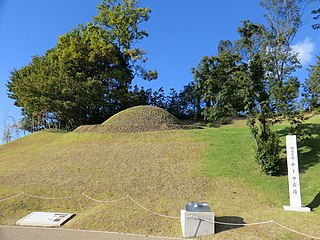
The Kitora Tomb is an ancient tumulus located in the village of Asuka, Nara Prefecture, Japan. The tomb is believed to have been constructed some time between the 7th and early 8th centuries, but was only discovered in 1983.
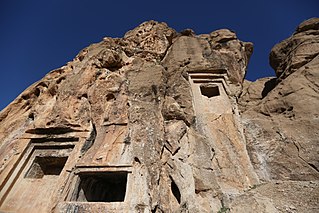
The Essaqwand Rock Tombs are three rock-hewn tombs located 25 km southwest of Harsin in Kermanshah Province, Iran. On top of the middle tomb there is a rock relief of a man with his profile toward the viewers. He is holding his hands in prayers in front of him. There is also a torch and a fire altar in front of him. Behind the fire altar there is another man, holding up something in his hands. The tombs have been attributed to different historical eras including Medes, Achaemenids, Seleucids and Parthians.

The Illyrian Tombs of Selca e Poshtme are located near the town of Pogradec in Albania near the village of Selcë e Poshtme. On the right bank of the river Shkumbin at an elevation of 1040 m above sea level, lie the remains of the ancient city of Pelion and the accompanying necropolis. The Roman Via Egnatia led past it towards Thessaloniki. Though there are traces of human activity in Neolithic times, the settlement proper dates to the Iron Age through to the Illyrian urban period, and reached its height under settlement by the Illyrian tribe of Enchele in the later Iron Age and was also occupied in the Roman period as traces of a municipal building show. From the 4th to 1st centuries BC the city was the royal residence of Illyrian kings and therefore, also probably an important political and economic centre. In 1996, Albania included the Royal tombs of Selca e Poshtme in the UNESCO World heritage list of proposals.
The Çanakçı Rock Tombs are a group of rock-carved tombs in Mersin Province, Turkey, right beside Kanlıdivane.
Deh-e Sefid Kan Sorkh is a village in Pachehlak-e Sharqi Rural District, in the Central District of Aligudarz County, Lorestan Province, Iran. At the 2006 census, its population was 391, in 76 families.
Deh Sorkheh is a village in Doab Rural District, in the Central District of Selseleh County, Lorestan Province, Iran. At the 2006 census, its population was 76, in 14 families.
Sorkh Deh is a village in Dastjerd Rural District, Khalajestan District, Qom County, Qom Province, Iran. At the 2006 census, its population was 94, in 29 families.
Deh Sorkh or Deh-e Sorkh may refer to:
Deh Sorkh is a village in Tabadkan Rural District, in the Central District of Mashhad County, Razavi Khorasan Province, Iran. At the 2006 census, its population was 415, in 105 families.
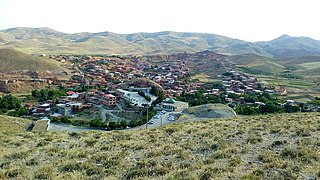
Deh Sorkh is a village in Sarjam Rural District, Ahmadabad District, Mashhad County, Razavi Khorasan Province, Iran. At the 2006 census, its population was 570, in 162 families.
Sorkh Deh is a village in Rudbar Rural District, in the Central District of Damghan County, Semnan Province, Iran. At the 2006 census, its population was 111, in 36 families.
Deh Gowd is a village in Sorkh Qaleh Rural District, in the Central District of Qaleh Ganj County, Kerman Province, Iran. At the 2006 census, its population was 137, in 41 families.
Deh Sorkh is a village in Sharvineh Rural District, Kalashi District, Javanrud County, Kermanshah Province, Iran. At the 2006 census, its population was 130, in 32 families.
Deh Sorkh is a village in Dowlatabad Rural District, in the Central District of Ravansar County, Kermanshah Province, Iran. At the 2006 census, its population was 171, in 26 families.
Sorkheh Deh is a village in Khaneh Shur Rural District, in the Central District of Salas-e Babajani County, Kermanshah Province, Iran. At the 2006 census, its population was 133, in 29 families.
Deh Sorkh is a city in Garkan-e Jonubi District of Mobarakeh County, Isfahan province, Iran.
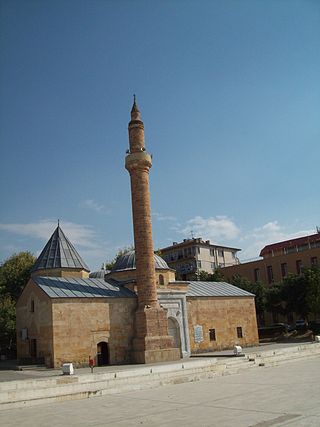
Tomb of Ahi Evren is a part of mosque-tomb complex in Kırşehir, Turkey.
Darehderaz is a village in Deh Bakri Rural District, in the Central District of Bam County, Kerman Province, Iran. At the 2016 census, its population was 54, in 14 families.

